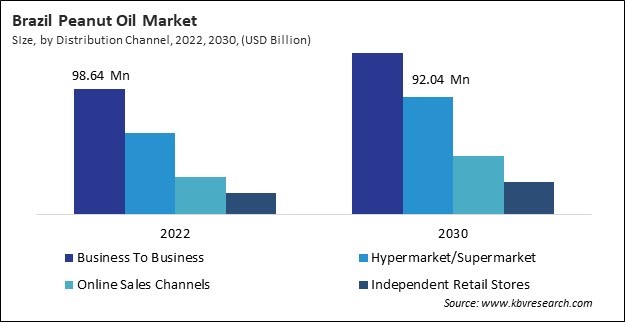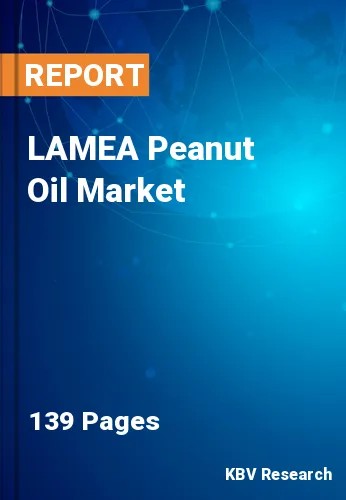The Latin America, Middle East and Africa Peanut Oil Market would witness market growth of 5.8% CAGR during the forecast period (2023-2030). In the year 2026, the LAMEA market's volume is expected to surge to 112.7 kilo tonnes, showcasing a growth of 7.4% (2023-2030).
Positioned as community-centric establishments, independent retailers foster relationships with local suppliers and manufacturers, facilitating direct access to unique and artisanal peanut oil varieties. Their intimate knowledge of the local market allows them to adapt quickly to changing consumer trends and preferences, stocking both traditional and innovative peanut oil products. Therefore, the UAE market will have 1.2 kilo tonnes of peanut oil at independent retail stores by 2030.

The Brazil market dominated the LAMEA Peanut Oil Market, by Country in 2022, and would continue to be a dominant market till 2030; thereby, achieving a market value of $282.5 Million by 2030. The Argentina market is showcasing a CAGR of 6.1% during (2023 - 2030). Additionally, The UAE market would register a CAGR of 5.4% during (2023 - 2030).
There is a growing trend toward specialty and gourmet cooking oils, and peanut oil is no exception. High-oleic peanut oil, known for its increased monounsaturated fat content, is gaining popularity among consumers seeking premium and specialty oils. These oils often cater to niche markets and appeal to those looking for unique culinary experiences. Consumers are increasingly opting for minimally processed and natural products. Cold-pressed peanut oil, produced through a method that involves minimal heat, is gaining traction for its ability to retain more of the oil's natural flavor and nutritional components.
As culinary boundaries continue to blur, there is a growing demand for authentic flavors. Consumers are exploring diverse cooking oils to recreate traditional dishes from different regions. The trend towards sustainability extends to packaging. Peanut oil manufacturers are exploring eco-friendly packaging options, such as recyclable materials and reduced packaging waste. Sustainable packaging adds to the product's overall environmental impact and is consistent with consumer values.
As per the International Trade Administration, the United Arab Emirates leads the Gulf Cooperation Council in eCommerce sales, which surged by 53% in 2020 to a record $3.9 billion, or 10% of overall retail sales. The Dubai Chamber of Commerce and Industry signifies that eCommerce will develop $8 billion in sales by 2025 as the UAE region has nearly 100% internet and mobile phone penetration. Thus, due to these aspects, the peanut oil market will expand across the LAMEA region in upcoming years.
Free Valuable Insights: The Worldwide Peanut Oil Market is Projected to reach USD 13.8 Billion by 2030, at a CAGR of 4.3%
Based on Application, the market is segmented into Food, Cosmetics, Pharmaceuticals, and Others. Based on Distribution Channel, the market is segmented into Business To Business, Hypermarket/Supermarket, Online Sales Channels, and Independent Retail Stores. Based on Type, the market is segmented into Refined, and Unrefined. Based on countries, the market is segmented into Brazil, Argentina, UAE, Saudi Arabia, South Africa, Nigeria, and Rest of LAMEA.
By Application (Volume, Kilo Tonnes, USD Billion, 2019-2030)
By Distribution Channel (Volume, Kilo Tonnes, USD Billion, 2019-2030)
By Type (Volume, Kilo Tonnes, USD Billion, 2019-2030)
By Country (Volume, Kilo Tonnes, USD Billion, 2019-2030)
Our team of dedicated experts can provide you with attractive expansion opportunities for your business.

